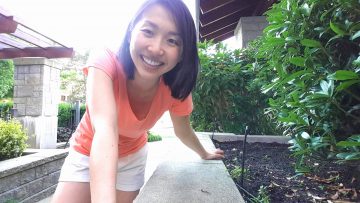Expected graduating year: December 2018
Degree: PhD
Supervisor: Dr. Brian Wilson
Hometown: Rothesay, New Brunswick / South Korea
You just returned from a research trip to South Korea, what were you working on there?
I was in South Korea for three months from March to May, 2017 to collect data for my PhD dissertation research. I’m exploring how environmental controversies surrounding the 2018 PyeongChang Winter Olympic Games are interpreted and experienced by different groups, and their resulting implications. Specifically, I focus on the contested development of Mount Gariwang, a former ‘Protected Area for Forest Genetic Resource Conservation’ for hundreds of years now turned into the official alpine skiing venue for three days of Olympic events.
While in Korea, I interviewed activists, journalists and local residents to see how each group made sense of the controversy. I also visited the development site to contextualize and better understand my interview data, and get a more nuanced and ‘visceral’ sense for my place-based research.
An overarching purpose of my research is to provoke thinking about the role of communication in asking questions of power and collective responsibility, and in envisioning alternative democratic and ecological futures.
Tell us about a highlight from the experience:
It would definitely be getting to meet and talk to such a wide range of people. All the more so because this was the part I was most nervous about (i.e. cold-calling strangers to see if they wanted to chat about this issue!). Most interview participants were more than eager to connect me to others, and it was a humbling experience not just in terms of learning more about the subject matter, but also about the different lived experiences that have led them there, shaping their values and visions as well.
Also, towards the end of my stay in Korea, I had the opportunity to present to the activists what the locals directly impacted by the development had to say. This was another highlight as most activists mentioned that this (hearing the voices of the locals) was something they did not get to do. This was a neat experience because it’s not often that grad students get to witness their work having real-life connections so immediately in front of their eyes!
Did anything surprise you?:
The fact that opinions varied significantly within the local community was surprising. It was a good reminder to take extra caution not to homogenize and romanticize the locals as always representing one solid body of resistance.
Why did you choose to do your graduate studies with UBC Kinesiology?:
I wanted to work with Dr. Brian Wilson as his research interests and mine are similar. He has done excellent work exploring social, cultural, political and environmental issues surrounding sport, physical activity and health – there is so much to learn from him. Also, UBC Kinesiology offers a range of socio-cultural kinesiology classes by experts in the field, as well as the flexibility to take courses in other departments according to your research interests. The longer I am here, the luckier I feel in having the opportunity to work alongside such dedicated professors and talented colleagues. Lastly, it would be a lie to say beautiful Vancouver and British Columbia weren’t a factor! 🙂
What advice to have for your peers?:
You are worth so much more than your productivity! Also, don’t let impostor syndrome get in the way of taking up opportunities – whether it be asking that burning question you feel is “too dumb” to ask, going up to talk to a prof at a conference, or taking a shot at a scholarship.
What do you hope to do after graduation?:
I’d like to leave my options open for as many career options as possible – whether that be in academia or otherwise. I’d like to do something that critically engages with, and addresses social inequality. There certainly is no shortage of different kinds of inequality but at the moment, I’m interested in environmental politics, justice, and ecological democracy.